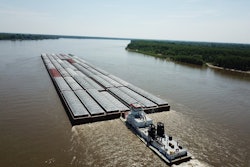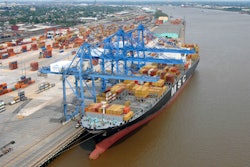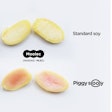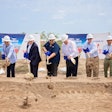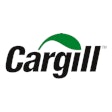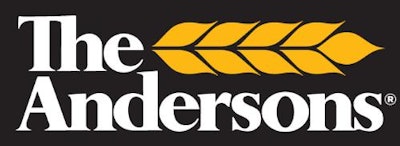
The Andersons, Inc. announces financial results for the first quarter ended March 31, 2020.
First Quarter Highlights:
- Company reported a net loss attributable to The Andersons of $37.7 million, or $1.15 per diluted share, and an adjusted net loss of $43.2 million, or $1.32 per diluted share.
- Adjusted EBITDA declined to $14.7 million for the quarter.
- Ethanol and corn demand were sharply lower in March, reflecting reduced vehicle travel.
- Trade Group reported a pretax loss of $10.0 million, and an adjusted pretax loss of $8.7 million, as lower ethanol demand caused significant depreciation in corn basis.
- Ethanol Group recorded a pretax loss of $37.4 and a pretax loss attributable to the company of $24.0 million, including $14.7 million of non-cash mark-to-market and inventory adjustments.
- Plant Nutrient Group improved year-over-year results by $2.7 million, recording a pretax loss of $1.2 million on lower operating and interest expenses.
- Rail Group earned $1.0 million of pretax income on lower lease income.
"The Andersons is a key player in essential businesses that are a part of the North American agriculture supply chain, and despite the challenging environment caused by the COVID-19 pandemic, our company remains healthy, resilient and strong," says President and CEO Pat Bowe. "We have continued to operate throughout the pandemic except for the previously announced ethanol plant maintenance shutdowns, and our balance sheet remains solid; we have ample liquidity to sustain us."
Company Actively Manages COVID-19 Pandemic
As an essential part of the North American agriculture supply chain, The Andersons' facilities fit within the definition of a critical infrastructure industry.
Agriculture is a key part of the nation's food supply, and agricultural products are incorporated into many other essential industries that needed to keep operating.
As such, it was important that the company continued to work closely with farmers and customers and support them through its ongoing operations.
When the COVID-19 pandemic reached the U.S, Bowe immediately created an executive-level response team, which has been monitoring the crisis, sharing information and best practices across the company's operations and managing its coordinated response.
The foundation for that response includes the guidance of the CDC, WHO, OSHA, and state and local governments, as well as benchmarking with both companies within the company's industries and with other U.S. companies.
Throughout this crisis, the health and safety of the company's employees, customers and suppliers has been a top priority.
They have been practicing appropriate social distancing and good hygiene at all its operating facilities.
Most office and administrative personnel began working from home on March 16. Earlier this week, the company began a phased and flexible approach for employees to return to offices as various states and localities modified their stay-at-home orders.
The company is also continuing its long tradition of giving back to the communities in which it operates.
- It has provided support to employees and their families through frequent communication, changes to work policies and enhanced benefits and wellness activities.
- Charitable donations made by related private foundation resources assisted those most in need.
- Employees have been encouraged to use the company's gift matching program to double their personal charitable donations.
- The company has promoted "no contact" volunteer opportunities as a way for employees and their families to serve their communities in this time of need.
- Bowe was selected to serve on Ohio Governor Mike DeWine's economic advisory board that is helping DeWine's administration work through the economic fallout of the pandemic.
Balance Sheet, Liquidity and Cash Management
"We have ample liquidity to withstand a protracted downturn in our businesses. More specifically, we currently have approximately $850 million of undrawn capacity from our primary revolving credit agreement," said Executive Vice President and CFO Brian Valentine.
"Covenants associated with our $1.65 billion base credit facility are measured based on minimum working capital and debt to capitalization.
"We have performed stress testing that indicates we will continue to be in compliance with our covenants for the foreseeable future."
The company has been consistently focused on expense management since early 2016.
Since that time, it has reduced expenses or created expense synergies through acquisition of more than $40 million.
The goal for 2020 before the onset of COVID-19 was to generate another $10 million of run-rate savings, including $5 million of additional synergies related to the Lansing Trade Group acquisition completed in the first quarter of 2019.
Considering the difficult operating environment caused by COVID-19, the company has taken an even stronger approach to cost controls and cash management.
- The company is targeting at least $20 million in additional expense reductions in 2020.
- As to capital expenditures, the company has limited spending in the near term to those projects that are required for employee safety or are critical to serving customer needs.
- The company expects to spend approximately $100 million on capital projects in 2020 after averaging more than $200 million over the last three years.
The company is, however, continuing to engage in growth capital projects or make growth investments, albeit at a more measured pace.
The Trade Group recently invested with five other businesses in a new business called Roger™, which has built an application that greatly simplifies the processes involved in shipping bulk commodities by truck.
First Quarter Segment Overview
Trade Group Records Lower Adjusted Results Driven by Low Ethanol Demand
The Trade Group recorded a pretax loss of $10.0 million and an adjusted pretax loss of $8.7 million for the quarter compared to an adjusted pretax loss of $6.3 million in the first quarter of 2019.
- The group recorded a non-cash, mark-to-market loss on its corn position during the quarter as basis depreciated due to lower ethanol demand.
- The food and specialty ingredients businesses enjoyed a strong quarter, more than doubling last year's first quarter results.
- The quarter also included an addition to credit reserves for an ethanol customer.
The group adjusted its reported pretax income by $1.3 million for stock compensation expense associated with the prior year acquisition of Lansing Trade Group.
The group's first quarter adjusted EBITDA was $9.9 million compared to first quarter 2019 adjusted EBITDA of $18.7 million.
The group expects continued pressure on the profitability of its Eastern assets until the 2020 corn crop is harvested.
However, the group believes an expected large corn crop in 2020 should help create increased space income beginning later this year and into 2021.
Ethanol Group Loss Driven by COVID-19 in March
The Ethanol Group reported a pretax loss attributable to the company of $24.0 million in the first quarter, compared to the $3.0 million of pretax income it earned in the same period in 2019.
The group's results included the consolidated results of all five ethanol plants due to the October 2019 merger of The Andersons Marathon Holdings, LLC (TAMH).
Beginning with the first quarter, it also included the results of the DDG trading business, which were previously included in Trade Group results.
Prior year results were recast for comparability.
- Margins declined in January and February and then fell significantly in March as the number of COVID-19 stay-at-home orders grew and gasoline demand plummeted.
- The group recorded a mark-to-market loss of $9.6 million on its hedged positions and an additional $5.1 million for its share of charges to write down inventory to net realizable value.
- TAMH's four plants continued to operate at highly efficient levels during the quarter.
The group recorded negative adjusted EBITDA attributable to the company of $14.0 million in the first quarter of 2020 compared to 2019 first quarter adjusted EBITDA attributable to the company of $4.1 million.
This result excludes the EBITDA allocable to the noncontrolling interests.
The group's decisions to aggressively halt production and use that down time to maintain its facilities while protecting its employees and conserving cash appear to have been the right moves.
Margins are beginning to improve and present opportunities for its highly efficient plants.
Production will be brought back on line throughout the second quarter as ethanol demand, logistics, and margin structure improve.
Plant Nutrient Group Records Improved Year-Over-Year Results
The Plant Nutrient Group improved its results year over year, recording a pretax loss of $1.2 million compared to a pretax loss of $3.9 million in the same period of prior year.
As of January 1, 2020, the group reorganized into three divisions: Ag Supply Chain, which includes wholesale distribution centers and service-oriented retail farm centers; Specialty Liquids, which includes manufactured products intended for agricultural and industrial uses; and Engineered Granules, which includes granular products for turf and agricultural uses, contract manufacturing and cob products.
- Volumes were up, with increases in Ag Supply Chain and Specialty Liquids partially offset by a decrease in Engineered Granules.
- Overall margin per ton was slightly lower overall, largely due to product mix. Margins on manufactured products improved while commodity distribution margins fell during the quarter.
- Improved Engineered Granules results were driven by lower cost of sales and operating expenses.
The group's current quarter EBITDA was $6.9 million, a 38 percent increase compared to 2019 first quarter EBITDA of $5.0 million.
The group's near-term outlook is positive, as weather has been favorable for planting and a large corn crop is anticipated.
The group continues to focus on cost reduction opportunities that have improved results over the last several quarters.
However, the group is feeling cautious about the 2021 crop year if demand for corn and beans does not improve.
Rail Group Results Down on Lower Lease Income
The Rail Group earned first quarter pretax income of $1.0 million compared to $4.3 million in the same period of the prior year.
- Railcar leasing income fell by $2.9 million on persistent headwinds in the sand and ethanol markets.
- Utilization, cars on lease and average lease rate were lower as railcar loadings continued to decrease.
- Income from car sales was marginally lower, primarily as a result of lower scrap steel pricing.
- Service and other pretax income was flat.
The group's first quarter 2020 EBITDA of $14.4 million was approximately 11 percent lower than first quarter 2019 EBITDA.
The COVID-19 pandemic has driven railcar loadings 11 percent lower year over year for the first seventeen weeks of the year, including decreases of more than 20 percent over the last several weeks.
This condition will likely place pressure on utilization and lease renewal rates and decrease demand for contract railcar repairs.


